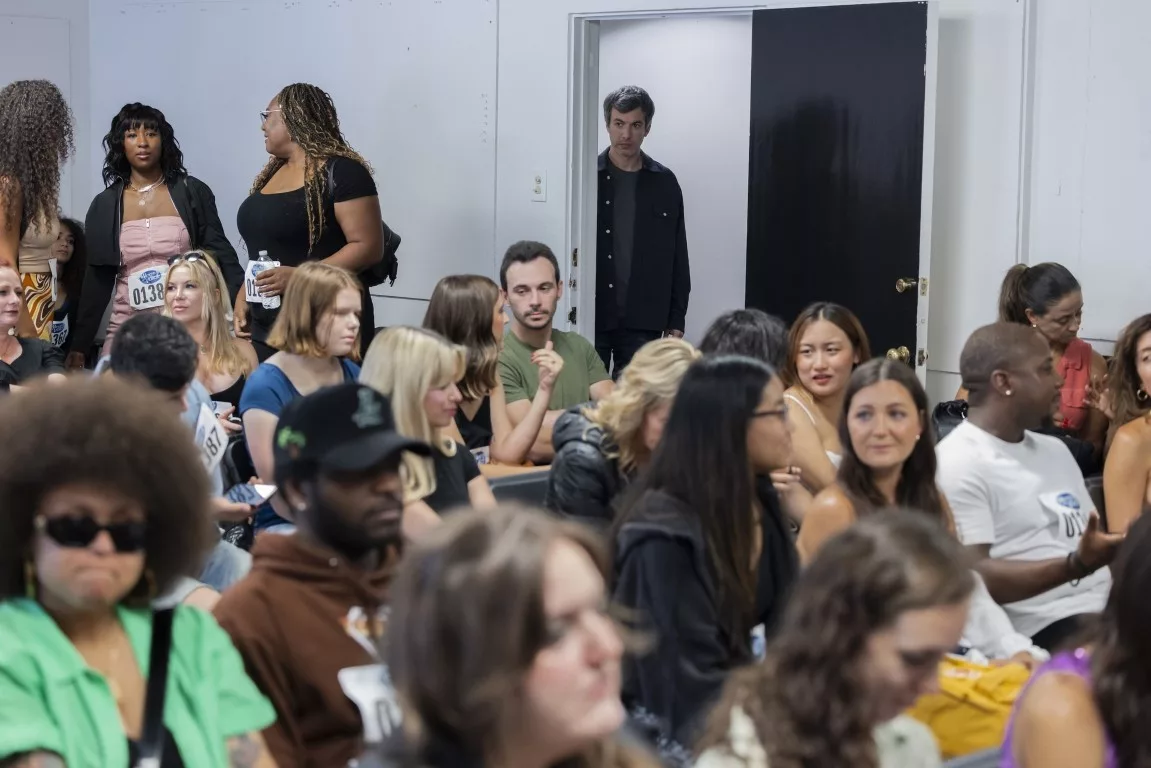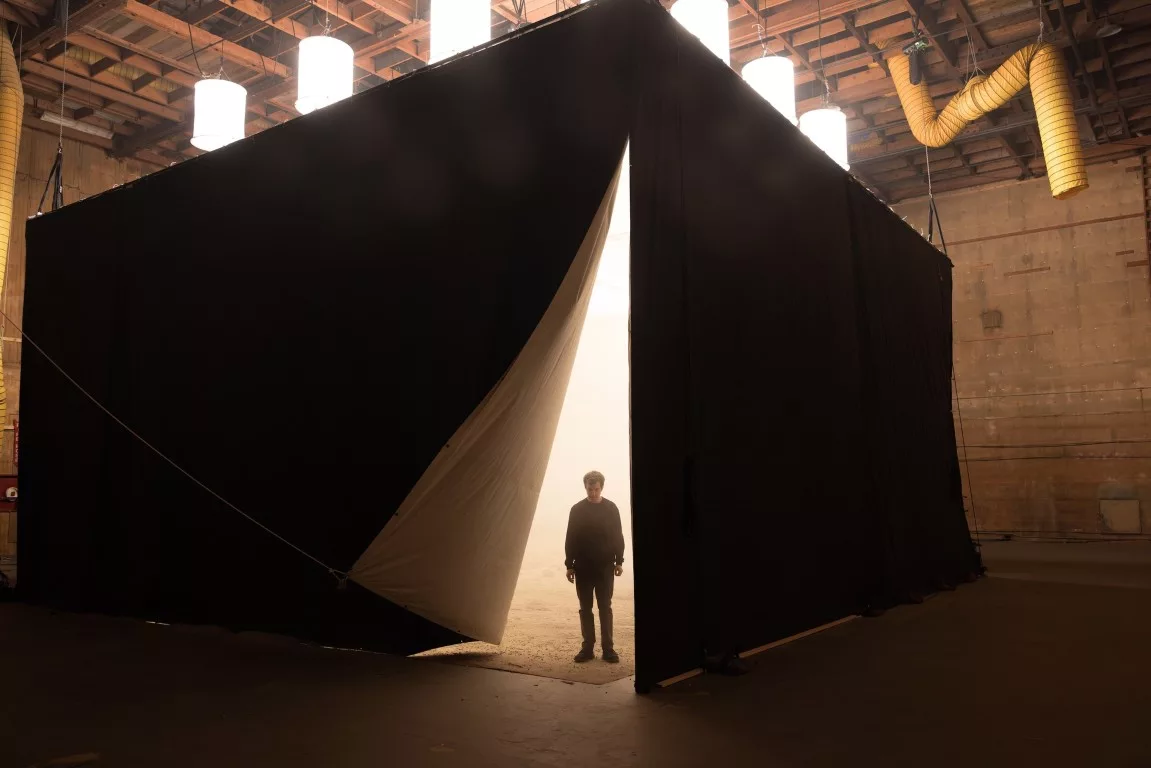There’s nothing quite like the Nathan Fielder stare. Those cold, dead eyes, the expressionless face, his tall, lanky body standing motionless in frame as he watches with fascination the strange, sometimes cruel experiments he inflicts on people. In “Nathan For You,” it was used to delightfully pranky effect; in “The Rehearsal,” it’s practically his deadliest weapon.
The first season of his latest show took his ambitions to understand (and, in some ways, conquer) the human condition to hilariously outsized levels: building a photorealistic bar so a subject could practice a difficult conversation with his trivia buddy, or fast-tracking the experience of fatherhood with an escalating series of actors playing his prospective child at different ages. With the second season of “The Rehearsal,” Fielder chooses to apply “The Fielder Method” to a much more altruistic goal: solving the epidemic of airplane accidents.
Fielder couldn’t have known how much this issue would crash (sorry) to the front of our public consciousness in the last few months. But that’s part of the bizarre prophecy of his work, and the cruel timing that makes this new batch of six episodes as gasp-inducingly hilarious as it is strangely poignant.

The season’s opening minutes are one of its greatest rugpulls: Two pilots, approaching a landing, the co-pilot nervously noticing their navigation is off but unable, for whatever reason, to tell the inflexible captain. Alarms go off, panic sets in, flames engulf the cockpit. Then, the camera pans, and there’s Fielder, standing as if floating in the sky in front of the airliner, surrounded by flames, like a vengeful, playful god. With that Stare.
It’s an elegant move that Fielder (who also directs all six episodes) employs to immediately set us in the metafictional play at work in “The Rehearsal,” and the structural dilemma he toys with this season. He’s developed a knack for these kinds of elegant playacting scenarios, constructing elaborate settings that people can use to “rehearse” potentially uncomfortable situations so they can account for every possible variable. But as he’s grown ever more obsessed with plane crashes, he thinks he can use the Method to address what he sees as the greatest issue plaguing these crashes: lack of communication and rapport between pilot and copilot.
From there, “The Rehearsal” travels down a rabbit-hole of social anthropology, trying to solve the problem that plagues pilots specifically about speaking up in the cockpit. And in so doing, he concocts the most convoluted, impressively elaborate (and wasteful of HBO’s bottomless pocketbook) situations in which to practice them.

It’s a journey that, in classic Fielder fashion, takes many twists and turns, even within a single episode. A chapter that starts with studying cloned dogs might just end with a Kaufman-esque deep dive into the life and memoir of Sully Sullenberger, in an attempt to relive a lifetime of experiences that led to his lifesaving decision to land his plane in the Hudson. It’s one of Fielder’s most Brechtian moves, and easily the season’s highlight.
But, just as with the previous season, Fielder tries to understand other people’s problems by understanding himself better, and season two takes that to even greater personal heights. The Fielder Method, after all, is something that makes him more comfortable existing in the world, and “The Rehearsal” is, if nothing else, a solipsistic exercise. Fielder knows this, and the show’s elegant writing lets him walk that delicate tightrope between lampooning his own self-importance and forging a more complete understanding of himself by forensically studying the people around him. He wants to save lives; that’s for sure. But he’s hoping that he can be the one to do it, and in so doing, find some piece of himself that’s missing.
The grand joke, of course, is that Fielder doesn’t think a piece of himself is missing, and what he does in “The Rehearsal” is just what everybody does when they prepare for a social interaction, right? But every move to help one of his subjects is also a way for him to map the human condition, and all of the little social pressures we have to navigate. It’s a move that’s led the show to be celebrated by autism awareness activists for accurately mapping the processes of masking and studying social cues to fit in, which becomes a curiously self-reflective strain in the new season as well.
It’s hard to explain the lengths Fielder travels to solve the twin problems of plane crashes and his own psyche in this latest season without just giving away all of the twists and turns. It would be folly to do so, and remarkably disrespectful to you, the viewer, and Fielder/HBO. But I can say that the scope of this season is staggering: a comedy show that tries to solve major societal problems and also feels so self-reflexive of its creator in brutally honest ways.
Fielder knows the very idea of him taking this journey is absurd, and never quite gives up the game of how much of a gag he’s taking this to be. The answer, it seems, is somewhere in the middle, and that dissonance is what keeps “The Rehearsal” flying high as one of the funniest, most insightful shows on television. “Maybe every new idea is funny until it’s proven,” he muses about the history of flight, and his grand experiment. “Maybe a clown can change the world after all.”
Whole season screened for review. Premieres April 20 on HBO.








